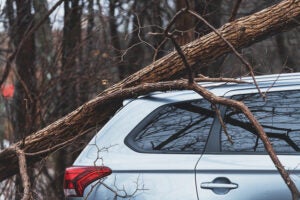Filing a home insurance claim

If you’re dealing with loss or damage to your home, whether it’s due to a weather event, home burglary or other unexpected event, you’re likely to feel overwhelmed. When it comes time to file a claim with your home insurance, you don’t want to encounter more stress in the process. Navigating the claims process can be stressful, but it doesn’t have to be. Bankrate’s insurance experts have outlined everything you need to know about filing a home insurance claim in the article below, from the types of claimable events to the steps for filing a claim.
How to file a home insurance claim
As soon as property loss occurs, you should consider contacting your home insurance company for help in filing your claim. Each insurer has its own home insurance claim process that policyholders need to follow. Regardless of how a home insurance claim is filed with your insurer — online or over the phone — it’s best to be prompt. Usually, the sooner you can initiate a claim, the earlier you may be able to resolve the issue.
- Help prevent further damage. Take measures to ensure your home’s structure will not suffer further damage while you wait for repairs.
- File a police report, if necessary. If your property loss is theft or vandalism related, contact the police right away. Law enforcement will gather important information about the damage, and you can provide details and evidence of what happened to your insurance company.
- Contact your insurer. You’ll learn what’s covered under your insurance policy and the best way to initiate a claim.
- Document the damage and fill out claims form. Take pictures of the damage and reference your inventory list, then file a claim.
- Have your claim inspected. A professional claims adjuster will inspect and document the estimated cost of damage.
- Complete repairs. With knowledge of how much of the damage will be covered, make a plan for repairs.
1. Help prevent further damage
While you are waiting for the situation to be resolved, you still have to manage your home. Experts suggest that you try to minimize further damage wherever possible. For example, if a tree fell on your home, make sure the parts of the home that are damaged are not likely to fall apart further. Check support beams and the roof to make sure they are secure until they can be repaired.
John Butkus, director of property claims for Country Financial, shares a few tips for homeowners to mitigate further damage. These include keeping your home tidy, boarding up shattered windows and covering holes with tarp. Butkus also recommends saving any receipts from basic repairs made, including the items purchased to complete them.
Nicole Shacket, a litigation attorney at Insurance Litigation Group, recommends that homeowners keep copies of any signed documents. “If you sign an agreement, work authorization or any type of document with a contractor, take a picture of the whole document with your phone. Know what you signed, when you signed, with who and for what.”
2. File a police report, if necessary
When a home insurance claim involves a crime, such as theft or vandalism, it’s important that you get the police involved. Contact your local police department to find out how you can file a police report. While the police may not find the perpetrator of the crime, they can help gather important details about the damage.
Insurance companies use the police report to get details about your claim and validate the information you give them. While most home insurance providers do not require that you file a police report, it can help shorten the claim process.
3. Contact your insurer
Experts generally recommend that you file a claim quickly, as it could impact how smoothly the process goes. David Adler, president and owner of Adler Insurance Group — an Allstate insurance agency in the Denver metro area — adds that verifying your policy’s listed perils with your insurer could be an important step in the process.
“Ask them if this specific loss is covered under your policy,” Adler says. “Get an understanding of your policy limits too and what your deductible costs will be. If your deductible costs more than the loss, it is likely not worth filing a claim for.”
Many questions about specific losses and what to file under your homeowners insurance can be answered by speaking directly with your provider.
4. Document the damage and fill out claims form
Document all damage thoroughly as soon as possible to give evidence of what has happened and what needs to be repaired. Documentation can include photos, videos and a list of items lost or damaged. Provide proof of ownership for any stolen items, if possible. Things like serial numbers, receipts of purchase or previous images of the items can help prove you owned the items.
After filing your claim, your insurance provider may ask you to fill out certain forms documenting the damage to your home or belongings. You may need to provide the following information:
- Personal information, like your name and date of birth
- Policy number
- Location of the loss
- Date of the incident
- Cause of the loss
- Estimated loss amount
Many insurance experts also recommend submitting photographic and video evidence to support your claim.
5. Have your claim inspected
After your claim is submitted, the insurance company will usually send a claims adjuster to assess the situation in detail.
John Espenschied, owner of Insurance Brokers Group in Chesterfield, Missouri, has been helping homeowners and business owners with their insurance needs for over two decades. He offers a friendly word of expert advice to homeowners at this stage.
“If there was any damage done, make sure that the adjuster inspects the property with you present before writing up an estimate for damages,” Espenscheid says. “Once they leave, their only source of information is going to be whatever paperwork they have from you. If anything was missed during their inspection, it could cause problems later on down the line when trying to get reimbursed for those items missing from their report.”
Espenschied also encourages his clients “to make a list of any damaged items and don’t be afraid to ask for a second opinion from an outside, independent appraiser.”
Adler advises having a contractor of your choice present for the adjuster’s inspection, as they might assist in voicing your concerns. In some instances, you may even want to hire a public adjuster. It usually takes a few days for your insurance company to reach out to schedule an appointment with its insurance adjuster, but if your area suffered widespread damage, the process could be slowed down.
6. Complete repairs
After your appointment with the insurance adjuster, there may be a wait for the claim payout checks from your insurance company so you can complete your repairs. Your payout may be issued via multiple partial payments, allowing you to work in stages as you make temporary repairs, replace your belongings and complete the more permanent repairs.
Things may get costly if you incur other expenses in the meantime, like moving out of your home. Fortunately, most homeowners policies include additional living expenses resulting from a covered loss, like for eating out or staying in a hotel. According to Butkus, some providers may even issue checks to policyholders on the spot.
What events can be claimed on your homeowners insurance?
There are several circumstances in which a homeowner may need to file a claim. Generally, consulting your policy and speaking with your insurer to know which perils are covered is a good first step to take.
But what exactly does homeowners insurance cover? Below are some of the most common sources of loss you may encounter.
| Coverage type | Details | Standard policy | Requires an additional policy or endorsement |
|---|---|---|---|
| Liability | If a guest is injured while on your property or you are found responsible for damaging someone else’s property, your personal liability coverage is designed to pay if you are found negligent. | ✔️ | |
| Theft & vandalism | Standard home insurance includes protections in case your home or belongings are vandalized or stolen. | ✔️ | |
| Fire | Many causes of house fires are covered, as specified in your policy. | ✔️ | |
| Hail & wind | A standard policy usually provides reasonable protections against hail and windstorms, but you may need additional coverage if you live in a high-risk area. | ✔️ | ✔️ |
| Explosion | If there is an explosion in or around your home, an average policy covers damages resulting from the blast. | ✔️ | |
| Falling objects | Things like falling satellites, asteroids, meteors and space debris are all typically covered under the standard homeowners insurance policy. | ✔️ | |
| Flooding | Flooding is handled differently than other water damage and requires a separate policy. | ✔️ | |
| Hurricanes | Depending on where you live, hurricane coverage may be included on a standard home insurance policy or may need to be added by endorsement. Talk to your agent to see how your policy covers damage caused by hurricanes. | ✔️ | ✔️ |
| Mold | Mold is typically only covered if it is caused by a covered peril under your policy, so you may need to consider additional coverage if you live in an area or property that is prone to mold. | ✔️ |
*This table should only be used as a guide, as all policies are different and may differ in coverage.
Protections can vary depending on which provider and policy you choose. For example, coverage for water damage may be tricky and is often defined with certain limitations. Talking to your agent or a representative from your company to make sure you understand your policy’s coverage before damage occurs may be a good idea.
First-time homebuyers may also approach their policy differently given their specific needs.
To be safe, always review your policy and discuss any questions you may have with an agent before purchasing.
Tips for filing a home insurance claim
There are a few things you can do to simplify the process of filing a home insurance claim, including:
- Keep an up-to-date home inventory: It can be difficult to remember even the most basic details related to your belongings after a covered event has occurred. Keeping a home inventory with purchase information, including identifying data like serial numbers and receipts, may make it easier to recoup the value of your items or buy replacements.
- Avoid throwing away damaged items: Although it can be tempting to clean up quickly after your home has sustained damage, doing so can hinder the insurance adjuster’s job when it comes to processing the claim. You should avoid throwing away damaged items until the claims adjuster can assess your home and contents, and keep receipts for reimbursement if you have to buy items as part of the clean up process.
- Maintain backup copies of important paperwork: Home inventories and other pieces of important paperwork can be destroyed or become unusable after the home has been damaged. It may also be helpful to consider storing copies of important paperwork away from the home, such as in a safety deposit box or digital copies on the cloud or computer server.
- Add photos or video to your home inventory: Many homeowners do not think to take photos until an actual incident occurs. However, taking photos or videos of your home and your belongings prior to any incidents can help with the claims process, especially if there are no other identifying factors, like serial numbers.
- Understand your mortgage company’s role: If you have a mortgage on your home, it’s important to understand how claim funds are distributed and used. In most cases, the insurance check will be made out to both you and your mortgage lender, since the lender has a financial interest in the property. To protect that interest, many lenders require the funds to be held in an escrow account and released in stages as repairs progress. Typically, an initial portion is made available upfront so you can hire a contractor and begin the work. The exact process can vary depending on your mortgage agreement. It’s a good idea to review your loan documents to understand your lender’s specific requirements, ideally before a loss occurs. This helps you avoid delays or unexpected issues after filing a claim. Contact your lender if you have any questions.
In some cases, you might have money left over after your insurance claim is settled. For example, if you choose a less expensive contractor, do some of the work yourself or use secondhand materials. Whether you’re allowed to keep those remaining funds depends on your state’s laws and the specific terms of your insurance policy.
It’s important to be honest and accurate in your claim. Misrepresenting the cost of repairs, inflating damage estimates, or claiming to have made repairs you didn’t complete can constitute insurance fraud. Consequences can vary but may include prosecution, jail time, fines, policy cancellation and even being rejected from future insurance coverage by other home insurance companies.
Questions to ask before filing a claim
Before filing a home insurance claim, it may be a good idea to consider your answers to the questions outlined below. Doing so may help you decide if it is worth filing a claim.
- What is the cost of repairs compared to my deductible?
- How will filing a claim impact my homeowners insurance rates?
- Will I lose discounts on my policy, like being claims free?
- How long will a claim stay on my record?
- Have I filed too many claims and could I be at risk of being nonrenewed or canceled?
- Was there any type of negligence on my part, such as poor maintenance, that contributed to the damage?
How does a home insurance claim impact your premium?
Filing a home insurance claim may result in a higher insurance premium. Generally, the insurance company sees you as more likely to file a claim in the future once you file a claim, and it may raise your premium to compensate for this risk. The likelihood of a higher premium increases if you make multiple claims.
Additionally, the type of claim you make plays a role in the impact on your premium. Claims for theft, water damage, mold, fire and dog bites may lead to steeper increases.
Terms to know when filing a home insurance claim
When filing a home insurance claim, there are some common terms and phrases that you may see frequently.
| Homeowners insurance term | Definition |
|---|---|
| Actual cash value (ACV) | Actual cash value is an item’s worth after depreciation. |
| Replacement cost value (RCV) | Replacement cost value reimburses the costs to repair or replace your home at current market value, excluding deductions for depreciation. |
| Insurance to value | Insurance to value refers to maintaining coverage amounts that match the value of your home as it changes. |
| Additional living expenses (ALE) | Additional living expenses provide homeowners with financial reimbursement should their property become uninhabitable due to a covered loss. Eligible expenses could include temporary lodging and laundromat services. |
| Adjuster | An insurance adjuster is another term for the insurance claims agent for your home insurance company. |
| Endorsement | An endorsement is an addition, modification or update that is made to an original home insurance policy. |
| Market value | The market value of your home is the amount you could sell it for. This will likely be different from the value your home is insured for. |
What to do if your insurance claim is denied
Not every insurance claim that is filed will be approved. So what should you do if your insurance claim is denied? The insurance company should send you a letter of explanation detailing why the claim was denied. Depending on the reason, you may be able to appeal the decision.
Let’s say, for example, that your claim was denied because the insurance company decided that the loss was not a covered peril, but you feel the damage should be covered. In that case, you may be able to file an appeal yourself with the insurance company, or you could opt to discuss next steps with a public adjuster or attorney. If you choose to file the claim yourself, be sure to check the process your insurance company uses to provide your steps of action. Even if you appeal your claim denial, there is no guarantee the claim will then be approved.
Frequently asked questions
Why we ask for feedback Your feedback helps us improve our content and services. It takes less than a minute to complete.
Your responses are anonymous and will only be used for improving our website.
You may also like

What is a comprehensive car insurance claim?

Is homeowners insurance tax-deductible?

Does homeowners insurance cover roof leaks?

When to file a home insurance claim and how to do it


